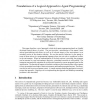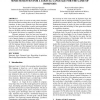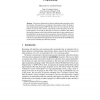130 search results - page 5 / 26 » Logic Programming Agents and Game Theory |
AAAI
2004
13 years 9 months ago
2004
We develop an exact dynamic programming algorithm for partially observable stochastic games (POSGs). The algorithm is a synthesis of dynamic programming for partially observable M...
ATAL
2006
Springer
13 years 11 months ago
2006
Springer
Qualitative Coalitional Games (QCGs) are a version of coalitional games in which an agent's desires are represented as goals which are either satisfied or unsatisfied, and ea...
ATAL
1995
Springer
13 years 11 months ago
1995
Springer
This paper describes a novel approach to high-level agent programming based on a highly developed logical theory of action. The user provides a specification of the agents’ bas...
AIA
2006
13 years 9 months ago
2006
Epistemic logic allows to reason not only about situations, but also about the knowledge that a set of agents have about situations. In later years, epistemic logic has been appli...
FSTTCS
2000
Springer
13 years 11 months ago
2000
Springer
We present a framework for decision making under uncertainty where the priorities of the alternatives can depend on the situation at hand. We design a logic-programming language, D...



